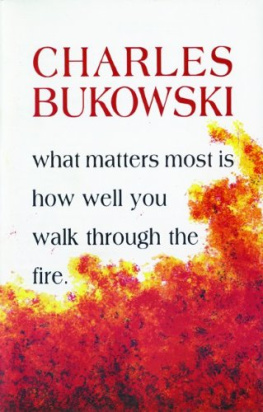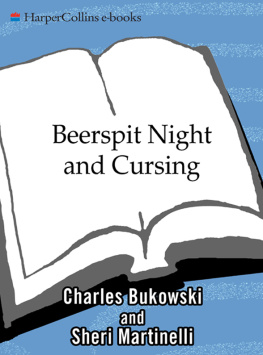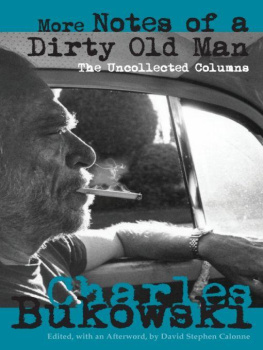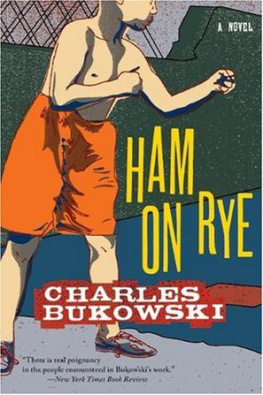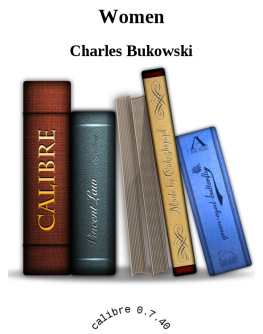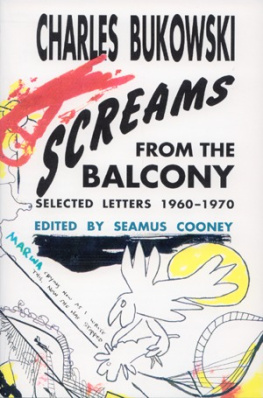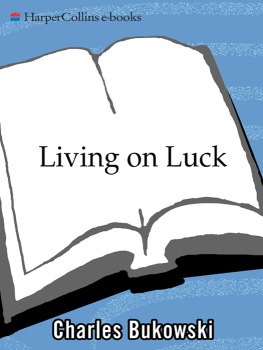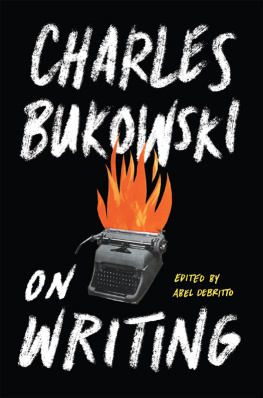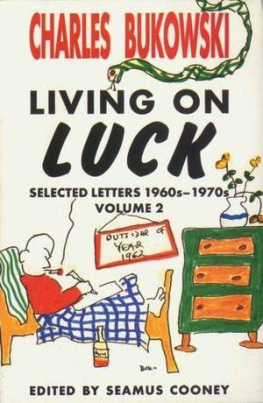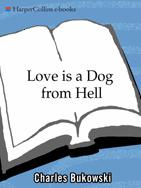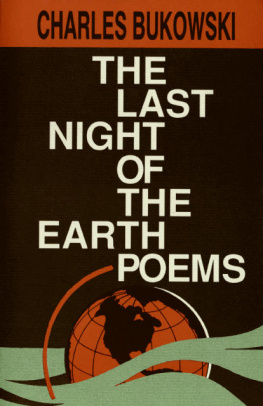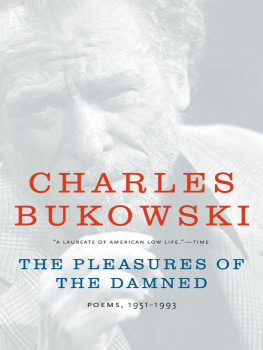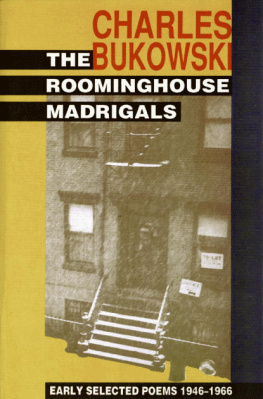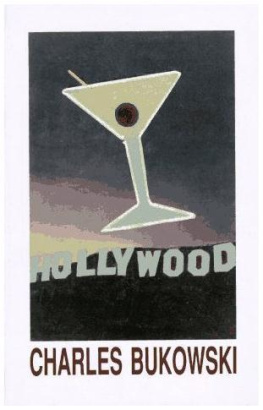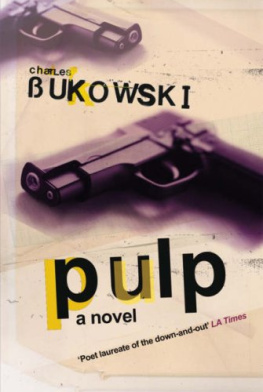Charles Bukowski - Burning in Water, Drowning in Flame: Selected poems 1955-1973
Here you can read online Charles Bukowski - Burning in Water, Drowning in Flame: Selected poems 1955-1973 full text of the book (entire story) in english for free. Download pdf and epub, get meaning, cover and reviews about this ebook. year: 2007, publisher: HarperCollins, genre: Art. Description of the work, (preface) as well as reviews are available. Best literature library LitArk.com created for fans of good reading and offers a wide selection of genres:
Romance novel
Science fiction
Adventure
Detective
Science
History
Home and family
Prose
Art
Politics
Computer
Non-fiction
Religion
Business
Children
Humor
Choose a favorite category and find really read worthwhile books. Enjoy immersion in the world of imagination, feel the emotions of the characters or learn something new for yourself, make an fascinating discovery.
- Book:Burning in Water, Drowning in Flame: Selected poems 1955-1973
- Author:
- Publisher:HarperCollins
- Genre:
- Year:2007
- Rating:3 / 5
- Favourites:Add to favourites
- Your mark:
- 60
- 1
- 2
- 3
- 4
- 5
Burning in Water, Drowning in Flame: Selected poems 1955-1973: summary, description and annotation
We offer to read an annotation, description, summary or preface (depends on what the author of the book "Burning in Water, Drowning in Flame: Selected poems 1955-1973" wrote himself). If you haven't found the necessary information about the book — write in the comments, we will try to find it.
Charles Bukowski: author's other books
Who wrote Burning in Water, Drowning in Flame: Selected poems 1955-1973? Find out the surname, the name of the author of the book and a list of all author's works by series.
Burning in Water, Drowning in Flame: Selected poems 1955-1973 — read online for free the complete book (whole text) full work
Below is the text of the book, divided by pages. System saving the place of the last page read, allows you to conveniently read the book "Burning in Water, Drowning in Flame: Selected poems 1955-1973" online for free, without having to search again every time where you left off. Put a bookmark, and you can go to the page where you finished reading at any time.
Font size:
Interval:
Bookmark:
 for Steve Richmond
for Steve Richmond The poems in the first three sections of this book are from the years 1955-1968 and the poems in the last section are the new work of 1972-1973. The reader might wonder what happened to the years 1969-1971, since the author once did vanish (literally) from 1944 to 1954. But not this time. The Days Run Away Like Wild Horses Over The Hills (Black Sparrow Press, 1969) contains the poems from late 1968 and most of 1969, plus selections from five early chapbooks not covered by the first three sections of this book. Mockingbird Wish Me Luck (Black Sparrow Press, 1972) prints poems written from late 1969 to early 1972. So, for my critics, readers, friends, enemies, ex-lovers and new lovers, the present volume along with Days and Mockingbird contain what I like to consider my best work written over the past nineteen years.
Each of these sections brings back special memories. For It Catches My Heart In Its Hands I was required to make a trip to New Orleans. The editor first had to check me out to see if I was a decent human being. Catching the train at the Union Station just below the Terminal Annex of the Post Office where I worked for Uncle Sam, I sat in the bar car and drank scotch and water and sped toward New Orleans to be judged and measured by an ex-con who owned an ancient printing press. Jon Webb believed that most writers (and hed met some good ones including Sherwood Anderson, Faulkner, Hemingway) were detestable human beings when they were away from their typewriters. I arrived, they met me, Jon and his wife, Louise, we drank and talked for two weeks, then Jon Webb said, Youre a bastard, Bukowski, but Im going to publish you anyhow.
I left town. But that wasnt all. Soon they were both in Los Angeles with their two dogs in a green hotel just off skid row. Re-check. Drink and talk. Goodbye. Goodbye.
Much leaving and waving through train windows. Louise cried through the glass. It Catches was published The bulk of the poems in Crucifix In A Deathhand were written during one very hot, lyrical month in New Orleans in the year 1965. Id walk down the street and Id stagger, sober Id stagger, hear churchbells, wounded dogs, wounded me, all that. I had gone into a slump or a blackout after the publication of It Catches, and Jon and Louise had brought me back down to New Orleans. I lived right around the corner from them with a fat, kind woman whose ex-husband (whod died) had come very close to being welterweight or middleweight champion of the world, I forget which.
Each night I went over to Jon and Louises and we drank until early morning at a small table in the kitchen with the roaches running up and down the wall in front of us (they particularly liked to circle around an unshaded lightbulb sticking out of the wall) as we drank and talked. I would go back to my place and awaken about 10:30 a.m., quite sick. Id dress and walk over to Jons place. The press was below street level and Id peek down at him before I knocked. I could see him through the window, calm, cool, hardly hungover at all, humming, and feeding pages of Crucifix into the press. (One had to be careful: feeding poems into a waiting press can easily dissolve into journalism.) Jon would become downright unlaced if I didnt have a handful of poems. (One had to be careful: feeding poems into a waiting press can easily dissolve into journalism.) Jon would become downright unlaced if I didnt have a handful of poems.
It wasnt as pleasant to be around that bastard then, and Id find myself back in my room beating the typer. In the evening, if I brought him a little sheaf of poems, his mood would be better. So I kept writing poems. We drank with the roaches, the place was small, and pages 5, 6, 7 and 8 were stacked in the bathtub, nobody could bathe, and pages 1, 2, 3 and 4 were in a large trunk, and soon there wasnt anyplace to put anything. There were 7-and-one-half foot stacks of pages everywhere. Very carefully we moved between them.
The bathtub had been useful but the bed was in the way. So Jon built a little loft out of discarded lumber. Plus a stairway. And Jon and Louise slept up there on a mattress and the bed was given away. There was more floor space to stack the pages. Bukowski, Bukowski everywhere! I am going crazy! said Louise.
The roaches circled and we drank and the press gulped my poems. A very strange time, and that was Crucifix I used to go to John Thomas place and stay all night. Wed take pills and drink and talk. That is, John took the pills and I took the pills and drank, and we both talked. John was then in the habit of taping everything, whether it was good or bad, dull or interesting, worthless or useful. We would listen to our conversations the next day, and it was a worthwhile process, at least for me.
I realized how oafish and overbearing and off-target I often was, at least when I was high. And sometimes when I wasnt. At one time during these tapings John asked that I bring over some poems and read them. I did. And left the poems there and forgot about them. The poems were thrown out with the garbage.
Months passed. One day Thomas phoned me. Those poems, Bukowski, would make a good book. What poems, John? He said he had taken out the tape of my poems and had listened to it again. Id have to type them off the tape, its just too much work, I said. Ill type them up for you.
I agreed, and soon I had the poems back in typescript form. At this time a balding red-haired man with a high, scrubbed forehead, meticulous and kind, with a very faint, perpetual grin was coming by. He worked as the manager of an office furniture and supply company and was a collector of rare books. His name was John Martin. He had published some of my poems as broadsides. He wrote me out checks as I sat in my kitchen across from him, drinking beer and signing the broadsides.
It was the beginning of the Black Sparrow Press, a house that was soon to begin publishing a large portion of Americas avant-garde poetry, but neither of us knew it then. I showed John Martin the poems Thomas had typed off the tape for me. I had checked his transcriptions, and hed done a careful, accurate job. John Martin took the poems home with him and phoned me a couple of days later: You have a book there and Im going to publish it myself. And thats how some almost lost poems were found again and printed in book form and the Black Sparrow was flying. I called the book At Terror Street And Agony Way .
Looking at these poems written between 1955 and 1973 I like (for one reason or another) the last poems best. I am pleased with this. I have, of course, no idea what shape my future poems will take, or even if I will write any, because I have no idea how long I will go on living, but since I began writing poetry quite late in life, at the age of 35, I like to think theyll give me a few extra years now, at this end. Meanwhile, the poems that follow will have to do. Charles Bukowski
January 30, 1974
lay down and wait like
an animal I awakened to dryness and the ferns were dead, the potted plants yellow as corn; my woman was gone and the empty bottles like bled corpses surrounded me with their uselessness; the sun was still good, though, and my landladys note cracked in fine and undemanding yellowness; what was needed now was a good comedian, ancient style, a jester with jokes upon absurd pain; pain is absurd because it exists, nothing more; I shaved carefully with an old razor the man who had once been young and said to have genius; but thats the tragedy of the leaves, the dead ferns, the dead plants; and I walked into a dark hall where the landlady stood execrating and final, sending me to hell, waving her fat, sweaty arms and screaming screaming for rent because the world had failed us both. next time take my left arm or a fifty but not my poems: Im not Shakespeare but sometime simply there wont be any more, abstract or otherwise; therell always be money and whores and drunkards down to the last bomb, but as God said, crossing his legs, I see where I have made plenty of poets but not so very much poetry.
Font size:
Interval:
Bookmark:
Similar books «Burning in Water, Drowning in Flame: Selected poems 1955-1973»
Look at similar books to Burning in Water, Drowning in Flame: Selected poems 1955-1973. We have selected literature similar in name and meaning in the hope of providing readers with more options to find new, interesting, not yet read works.
Discussion, reviews of the book Burning in Water, Drowning in Flame: Selected poems 1955-1973 and just readers' own opinions. Leave your comments, write what you think about the work, its meaning or the main characters. Specify what exactly you liked and what you didn't like, and why you think so.

